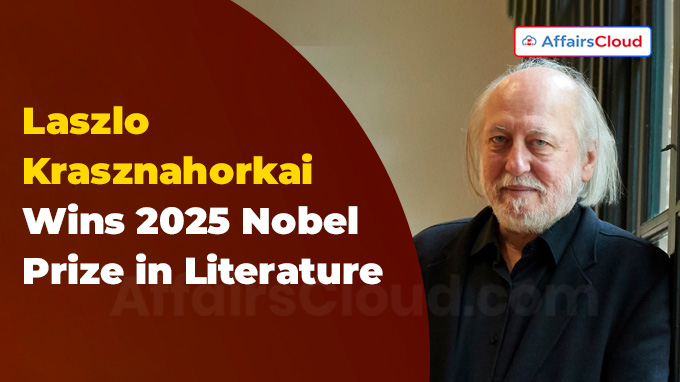On 9th October 2025, the Royal Swedish Academy of Sciences awarded the Nobel Prize in Literature 2025 to Hungarian author László Krasznahorkai “for his compelling and visionary oeuvre that, in the midst of apocalyptic terror, reaffirms the power of art.”
- He became the second Hungarian author to win the Nobel Prize in Literature, following Imre Kertész in 2002.
- The Nobel Prize will be presented on 10 December 2025 in Stockholm, Sweden, commemorating the death anniversary of Alfred Nobel.
Exam Hints:
- What? Nobel Prize in Literature 2025
- Organiser? Royal Swedish Academy of Sciences
- Laureate: László Krasznahorkai
- Prize Components: 11 million SEK cash
- Award Ceremony: December 10, 2025, Stockholm, Sweden
- 2024 Laureates: Han Kang, South Korean writer & novelist
- Indian Literate Laureate: Rabindranath Tagore
- Total Awards (1901-2025): 118 Nobel Prizes in Literature have been awarded to 122 laureates, including 18 women.
- Multiple Winners: No individual has received the Literature Nobel more than once.
Winners of Nobel Prize in Literature 2025:
| Nobel Laureate | Awarded for |
|---|---|
| László Krasznahorkai | For his compelling and visionary oeuvre that, in the midst of apocalyptic terror, reaffirms the power of art |
About László Krasznahorkai:
Distinguished Author: László Krasznahorkai, born in 1954, is a Hungarian novelist and screenwriter, celebrated for his challenging, postmodern works.
- He was recognised for his demanding and visionary novels that explore dystopian, melancholic, and existential themes, reshaping the boundaries of contemporary literature with profound philosophical and stylistic depth.
Signature Works: Known for Satantango (1985) and The Melancholy of Resistance (1989), his dystopian, melancholic novels have inspired acclaimed film adaptations by Béla Tarr.
Other Awards: 2015 Man Booker International Prize for his profound literary contributions.
About Nobel Prize in Literature:
Medal Design: The Nobel Prize in Literature medal was designed by Swedish sculptor Erik Lindberg in 1902.
- Reverse imagery: The reverse depicts the Goddess of Nature, Isis, emerging from clouds and holding a cornucopia, while the Genius of Science lifts the veil covering her face.
- Inscription: The Latin inscription “Inventas vitam iuvat excoluisse per artes” translates to “It is beneficial to have improved human life through discovered arts”.
Prize Details:
- Components: Nobel laureate receives a gold medal, a personal diploma and a cash award.
- Cash Awards 2025: The total cash prize for 2025 is 11 million Swedish kronor (SEK), approximately USD 1.2 million.
Facts of Nobel Prize in Literature (1901 to 2025):
Total Awards: Between 1901 and 2025, a total of 118 Nobel Prizes in Literature have been awarded to 122 laureates, including 18 women.
Shared Prizes: The prize has been shared between two laureates on four occasions. No individual has received the Literature Nobel more than once.
Years Not Awarded: The Nobel Prize in Literature was not awarded in 1914, 1918, 1935, 1940, 1941, 1942, and 1943.
Youngest Laureate: Rudyard Kipling received the prize in 1907 at age 41, “in consideration of the power of observation, originality of imagination, virility of ideas and remarkable talent for narration which characterize the creations of this world-famous author.”
Oldest Laureate: Doris Lessing received the prize in 2007 at age 87, “that epicist of the female experience, who with scepticism, fire and visionary power has subjected a divided civilisation to scrutiny.
First Woman Laureate: Selma Lagerlöf, a Swedish author, won in 1909, becoming both the first woman and first Swedish writer to receive the Nobel Prize in Literature.
Indian Laureate: Rabindranath Tagore became the first Indian and Asian Nobel laureate in 1913 for his profoundly sensitive and beautifully crafted verse, bringing his poetic thought in English into Western literature.
2024 Nobel Prize in Literature: South Korean writer and novelist Han Kang was awarded the 2024 Nobel Prize in Literature for her intense poetic prose that addresses historical traumas and reveals the fragility of human life.
About Nobel Prize:
Origin: The Nobel Prize was created using the wealth of Alfred Nobel, the Swedish inventor and industrialist.
Administration: The prize is overseen and managed by the Nobel Foundation based in Stockholm, Sweden.
Purpose: It recognizes exceptional contributions and discoveries that provide significant benefits to humanity.
Fields: Since 1901, the Nobel Prize has been awarded in Physics, Chemistry, Physiology or Medicine, Literature, and Peace.
Economic Sciences: In 1968, the Sveriges Riksbank Prize in Economic Sciences in Memory of Alfred Nobel was added as a sixth category.





